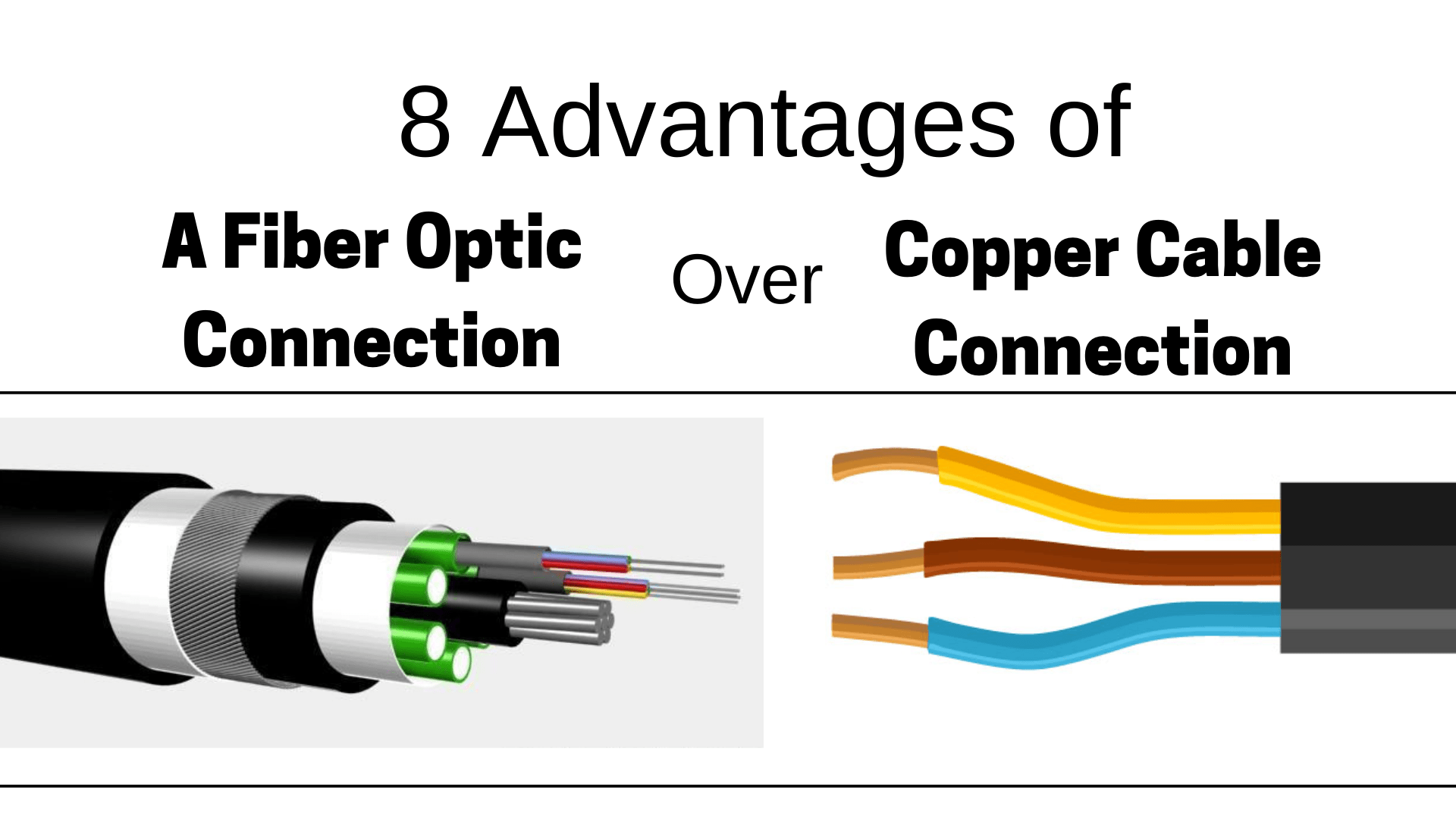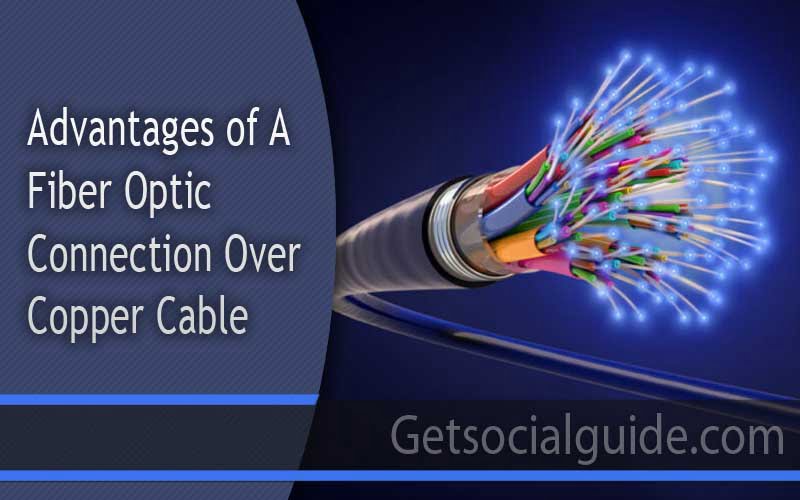8 Advantages of a Fiber Optic Connection Over Copper Cable Connection
Having a higher connectivity speed is critical for modern businesses. However, since a good percentage of businesses now have an online presence, a slow internet speed can prove costly. To achieve such excellent high-speed internet services, fiber optic cables have become the most wanted option for many reasons.

While traditional copper cables have proven their worth over time, fiber optics offer several advantages that you should consider for your connection. Since fiber optics is the new norm in the market, internet and cable services are keen to provide their users with upgraded technology to ensure reliability and high-speed connectivity. But what makes fiber optic cables so great, and why are they so popular? This post will look at the advantages of fiber optic cables over copper cables to understand why you should choose fiber optics when hiring a new cable service.
What Makes Fiber Optics So Fast?
Fiber optics has an obvious advantage over copper cable in data transmission because of its transmission mechanism. While copper cables rely on conduction to transmit signals, fiber optics do it with light. That means the signals are traveling at the speed of light, which is unmatched by any other technology. It provides a significant advantage to internet cable service providers because they can maintain a high-speed transmission even at peak hours.
Main Advantages of Using Fiber Optic over Copper Cables
Compared to copper cables, fiber optics are incredibly faster. But that’s not the only advantage. Instead, fiber optics can be beneficial for commercial and personal use because:
- There is minimal signal attenuation in fiber optics during transmission.
- Fiber optics aren’t affected by electromagnetic interference, so the received signal quality doesn’t suffer.
- Fiber optics don’t break that easily compared to copper cables.
In terms of reliability, fiber optics can be quite beneficial, saving the service cost in the long term. Here is a comparative analysis of fiber and copper cables to explore why Fiber Optics can be the best bet for your internet and TV service.
Fiber Optic Cables Allow Greater Bandwidth
The diameter of the connecting cable has a significant role in deciding the transmission bandwidth. For the same diameter of the wire, fiber optic cables offer a larger bandwidth. This means that the wires carry more data at one time. That’s how you can improve the transmission speed, especially for satellite TV and internet requirements. Moreover, fiber cables have multiple modes, such as single-mode and multimode fiber. The single-mode fiber can deliver twice the throughput, making it a great option if you want high-speed live streaming and gaming connectivity. Since copper cables were initially meant for carrying voice signals, there isn’t much of an option for increasing the bandwidth of these cables. That’s why top cable services like Bestcablesatellitetv.com focus primarily on fiber cables to provide flawless speed and higher bandwidth for its users.
Fiber Cables are Way Faster
The fastest copper cable technologies include Cat5 and Cat6, which are incredibly fast in data transmission. However, their speeds differ from fiber cables that can provide even faster data transmission, only 31% slower than the actual speed of light. That’s because fiber cables rely on a core that transmits light signals within. Hence, the upload and download speeds can be incredibly higher with fiber cables. The best internet cable services can provide up to 1 Gigabit per second download speed and a 5 Gigabit per second upload speed to the users. On the other hand, even though technically well-equipped, copper cables only reach up to 300 Mbps.
Long Distance Connectivity Causes Attenuation in Copper Cables
Since copper cables are full of impurities, they tend to attenuate transmission signals over longer distances. That’s why copper cables are not as effective for transmission over large areas. On the other hand, fiber cables are meant for long-distance transmission. Hence, they are primarily used in cell phone towers and remote locations. Typically, cell phone towers are connected via fiber optic cables. Generally, a typical fiber cable can carry a signal up to 25 miles in a single-mode fiber cable for a ten Gbps transmission. This is significantly higher than the 328-foot range in the case of copper cables.
Fiber Cables are Sturdy – An Ideal Option for ADT Camera Security Systems
Since fiber cables can carry a more significant throughput in a given diameter, they are ideal for installation inside homes. For instance, if you’re setting up an ADT security system inside your home, fiber optics give you the suitable options because they are lightweight and incredibly sturdy. Hence, they can resist more pull and push and don’t break easily. On the other hand, copper cables are prone to breakage and damage. Generally, copper cables can’t resist beyond a 25-pound pressure. For fiber cables, you can quickly increase this pressure up to 200 pounds. That’s why fiber cables significantly appeal to commercial companies who want long-term reliable resources to provide internet and TV service to their audience.
Fiber Cables are More Reliable
Other than damage resistance, fiber cables are also great for regions that regularly experience extreme conditions. Therefore, handling severe weather, moisture and heat are much easier for fiber cables than copper cables. Moreover, fiber cables don’t get noisy due to electromagnetic interference, but copper cables do. The interference can cause significant damage and interruption during data transmission, which can be critical for commercial users. Moreover, copper cables are always prone to catching or starting a fire, but fiber cables are safe.
Fiber is Flexible for Upgrades
Thanks to media converters, upgrading fiber cable networks and adding them to the existing networks is more accessible. Generally, fiber converters allow you to extend your UTP ethernet connection over your fiber optic connection. So you don’t need to upgrade the hardware every time. Generally, there are modular patch panel solutions that allow 10 Gb and 40 Gb connections to upgrade according to the connection requirements. Moreover, it enhances the connection flexibility for the future.
Copper is Expensive
One of the significant benefits of fiber cables is the installation and ownership cost. Even though fiber cables can cost higher initially, they are way more reliable and durable than copper cables. That’s why it saves the cost of ownership in the long term. In addition, since they are reliable and sturdy, fiber cables require less maintenance and are easily upgradable to newer technologies. That’s why fiber cables can be the right option if you want a long-term investment for setting up a home security system or automation system in your office.
Fiber Optic internet is Much Safer
Most modern home and office setups are keen to integrate the best cyber-security protocols for their connection. Whether you’re enjoying a DIRECTV stream, or a satellite TV and internet, it must be secure, With copper cables, it’s straightforward to connect a copper wire and create interception for the signals. However, fiber cable connections require sophisticated tools to make a new joint or connection on an existing line. Therefore, it makes fiber cables much more secure and resistant to any connection leakages in a network.
Conclusion
Fiber optic cables offer significant advantages over copper cables, so many satellite TV and internet services are slowly shifting to fiber optic networks. Most modern and futuristic technologies will rely on fiber cables so it’s a wise decision to shift to fiber cables.



